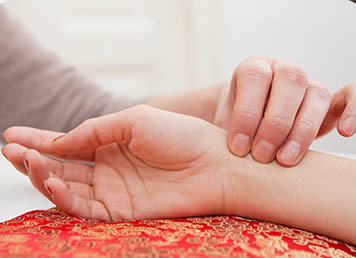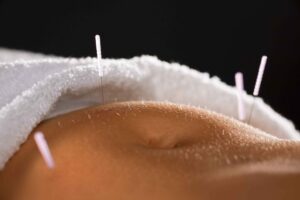Crohn’s Disease
Crohn’s Disease
Crohn’s disease is an inflammatory bowel disease abdominal pain, diarrhea, weight loss, and fatigue. Living with Crohn’s disease can be challenging. Acupuncture and Chinese medicine can help to reduce your pain, inflammation, and symptoms, and improve your quality of life.
Throughout my years of clinical experience, I have helped many patients with Crohn’s disease reduce pain, improve function, as well as avoid the need for more invasive medications and procedures. When acupuncture and Chinese medicine are used to reduce inflammation and stop the pain, it provides an opportunity for the body to heal itself.
In this article, I will tell you how acupuncture works to treat Crohn’s disease, share research about how it works, as well as discuss how I create personalized acupuncture and Chinese medicine treatments for each individual.

What is Crohn’s disease?
Crohn’s disease is a chronic inflammatory bowel disease (IBD) that can affect any part of the gastrointestinal (GI) tract, from the mouth to the anus. However, it most commonly involves the small intestine, particularly the ileum (the last part of the small intestine), and the beginning of the colon (large intestine). Unlike ulcerative colitis, which affects only the inner lining of the colon, Crohn’s disease can involve multiple layers of the intestinal wall, leading to a variety of complications.
The exact cause of Crohn’s disease remains unknown, but it is believed to result from a combination of factors genetic predisposition, and immune system dysfunction, and may be triggered by environmental factors.
The symptoms of Crohn’s disease include abdominal pain and cramping, diarrhea, weight loss, fatigue, fever, and ulcers. They can vary in severity and frequency, and they may come and go over time. Some individuals with Crohn’s disease may experience mouth ulcers or canker sores.
Traditional Chinese Medicine for Crohn’s Disease

Acupuncture and Chinese medicine work by targeting the underlying imbalance causing the diseases. The TCM diagnosis for an individual with Crohn’s disease will depend on the specific pattern of disharmony or imbalance observed.
During the initial visit, I will take a detailed medical history and evaluate the tongue and pulse to determine the appropriate diagnosis and treatment plan. Key symptoms to determine the imbalances are abdominal pain, appetite, consistency of bowel movements, fatigue, as well as feelings of hot and cold.
The most common disharmonies for Crohn’s disease include Qi deficiency, heat toxicity, and damp heat. Other factors may include liver Qi stagnation and blood stasis.
The treatment approach for Crohn’s disease in TCM is personalized to each patient. It will include a combination of acupuncture and herbal medicine. The goal is to remove the imbalances as a means to restore balance. These therapies have been shown to reduce inflammation, improve digestion, and stop the pain in Crohn’s disease.
Acupuncture
Acupuncture is a natural treatment for Crohn’s disease that works by stimulating the body to reduce inflammation, release natural painkillers, and stimulate gut motility. In this way, it targets the root causes of the condition allowing the body to heal itself.
Acupuncture treatment is customized to each patient. To create the customized acupuncture therapy I will focus on reducing symptoms and working to treat the underlying inflammation. We call this treating both the root and the branch of the condition.
Acupuncture point prescriptions will be made in order to address the specific imbalances. Some of the points on the abdomen will help reduce pain and promote gastric motility such as
- ST25 (Tianshu): ST25 helps regulate the intestines, relieve abdominal pain, and promote bowel movement.
- CV12 (Zhongwan): CV12 is an important point for strengthening the Spleen and Stomach, harmonizing the Middle Jiao, and alleviating abdominal pain and distention.
- CV6 (Qihai): CV6 is a point that tonifies the Qi, strengthens the Spleen and Stomach, and helps alleviate abdominal pain and distention.
Other points may be chosen to address different aspects of the pattern imbalance such as:
Qi Deficiency:
- ST36 (Zusanli): This point strengthens the Spleen and Stomach, and supports the overall Qi. Moxibustion can also be done on this point.
- SP3 (Taibai): This point tonifies the Spleen and helps resolve Dampness.
Damp-Heat in the Large Intestine:
- ST25 (Tianshu): This point regulates the intestines and clears Heat.
- ST37 (Shangjuxu): This point helps to eliminate Damp-Heat from the intestines.
- LI11 (Quchi): This point clears Heat and resolves Dampness.
Acupuncture and Chinese medicine can be used along with your conventional treatments. Patients come in 1-2 times per week depending on the severity. After an initial treatment course of 8-12 visits, the benefits are greater and more long-lasting. Treatment effects are cumulative. Many patients are stable and remain pain free without regularly needing acupuncture. For others, we may create a maintenance program with one visit every other week or once a month.
How Acupuncture Works
Research has shown that acupuncture has anti-inflammatory effects. One way acupuncture reduces inflammation is by regulating pro and anti-inflammatory chemicals called cytokines. It can reduce proinflammatory cytokines such as tumor necrosis factor-alpha (TNF-α) and interleukin-8 (IL-8) while increasing interleukin-10 (IL-10) which is an anti-inflammatory cytokine (1). Balancing these chemicals can help alleviate the inflammation in the intestinal mucosa.

Acupuncture has also been shown to reduce pain overall by stimulating the body to release natural pain-relieving chemicals. Another possible way acupuncture helps is through the modulation of the gut microbiota. Emerging research suggests that acupuncture may influence the composition and function of the gut microbiota, which will help maintain gut homeostasis, reduce inflammation, and improve overall gut health (2).
Many clinical trials have also shown that acupuncture is safe and effective treatment for reducing Crohn’s disease symptoms. Not only does acupuncture reduce symptoms but it can also improve the quality of life and general well-being. (2,3,4,5)
Herbal Medicine
After the initial visit, we will discuss the treatment plan. Some patients will also use herbal medicine to help reduce inflammation, improve the immune system, and reduce pain.
Chinese herbal medicine, much like acupuncture, targets the specific pattern of disharmony contributing to your Crohn’s disease symptoms. An herbal formula is a combination of 4-12 herbs. The herbs are specifically targeted to address both the root cause (underlying imbalance) and the symptoms or manifestations (also known as the branch”) of a disease.
Based on the nature of the condition, I will create a personalized herbal formula designed to address addressing the imbalance and promote healing in the body. Common imbalances include Qi deficiency, damp heat, and heat toxicity, among others.
The herbs are combined in a specific way to address the primary imbalances, as well as reduce the symptoms such as diarrhea, abdominal pain, and cramping, reduce inflammation, and calm the mind and body.
The exact combination of herbs and their proportions will vary depending your unique pattern of disharmony and specific symptoms. As the treatment progresses the specific herbs in the formula may change.
Additionally, I will work closely with your healthcare team to ensure the safe and effective use of herbal medicine in the context of your overall treatment plan. .
Diet
Many people with Crohn’s and Colitis have benefited from anti-inflammatory diets. One in particular that my patients have found helpful is the Specific Carbohydrate Diet (SCD).
The main principle of SCD is to eliminate certain types of carbohydrates that are thought to contribute to inflammation and digestive issues in people with IBD. These problematic carbohydrates are considered difficult to digest and may lead to an imbalance of gut bacteria, exacerbating inflammation in the intestines. Removing the offending carbohydrates reduces inflammation, allows the gut to heal.
Conclusion:
If you’re living with Crohn’s disease and interested in exploring the potential benefits of Acupuncture and Chinese Herbal Medicine, schedule a consultation with us. We are committed to helping you achieve a better quality of life through holistic healthcare and personalized treatment plans. Call us today at 212-319-5757 or book an appointment online.
This article is for educational purposes only and does not constitute medical advice. For specific treatment call us or find a local practitioner.
- Yang, X., He, M., Tang, Q., Wang, Z., Jin, D., Wu, X., . . . Li, T. (2023). Assessment of anti-inflammatory efficacy of acupuncture in patients with inflammatory bowel disease: A systematic review and meta-analysis. Complement Ther Med, 74, 102946. doi:10.1016/j.ctim.2023.102946
- Bao, C., Wu, L., Wang, D., Chen, L., Jin, X., Shi, Y., . . . Wu, H. (2022). Acupuncture improves the symptoms, intestinal microbiota, and inflammation of patients with mild to moderate Crohn’s disease: A randomized controlled trial. EClinicalMedicine, 45, 101300. doi:10.1016/j.eclinm.2022.101300
- Joos, S., Brinkhaus, B., Maluche, C., Maupai, N., Kohnen, R., Kraehmer, N., Hahn, ESchuppan, D. (2004). Acupuncture and moxibustion in the treatment of active Crohn’s disease: a randomized controlled study. Digestion, 69(3), 131-139. doi:10.1159/000078151
- Schneider, A., Streitberger, K., & Joos, S. (2007). Acupuncture treatment in gastrointestinal diseases: a systematic review. World J Gastroenterol, 13(25), 3417-3424. doi:10.3748/wjg.v13.i25.3417
- Bao, C. H., Zhao, J. M., Liu, H. R., Lu, Y., Zhu, Y. F., Shi, Y., . . . Wu, H. G. (2014). Randomized controlled trial: moxibustion and acupuncture for the treatment of Crohn’s disease. World J Gastroenterol, 20(31), 11000-11011. doi:10.3748/wjg.v20.i31.11000